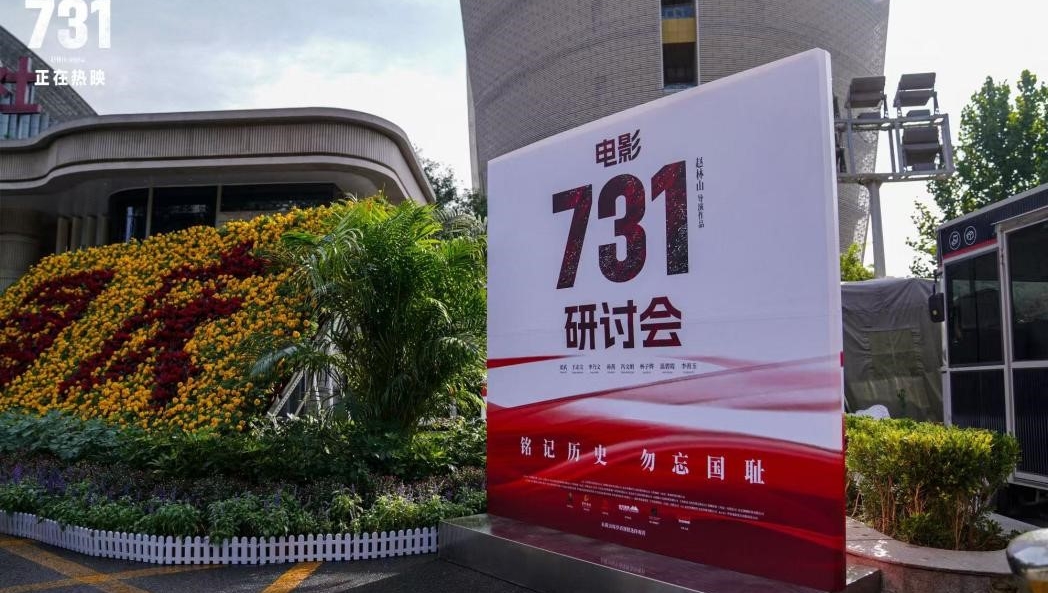
The symposium "Remembering History, Cherishing Peace: Evil Unbound" is held in Beijing, Sept. 26, 2025. [Photo provided to China.org.cn]
Scholars, filmmakers and historians gathered in Beijing on Sept. 26 for a symposium examining the historical and artistic significance of the recently released film "Evil Unbound," also known as "731."
The event, titled "Remembering History, Cherishing Peace: Evil Unbound," comes as China marks the 80th anniversary of victory in the Chinese People's War of Resistance Against Japanese Aggression and the World Anti-Fascist War. The film has generated discussion about how cinema preserves historical memory while promoting peace.
Changchun Film Group organized the symposium with support from the China Film Critics Association. Participants included experts from the film industry, academia and Party history research institutions who explored cinema's role in keeping wartime memories alive.
Speakers emphasized cultural confidence and artistic responsibility in historical filmmaking. Zhou Jiandong, vice chairman of the China Film Producers' Association, called for courage in tackling weighty historical subjects.
"Administrative departments must show more confidence," Zhou said. "Works that bear historical responsibility will be recognized by the market. We should speak out proactively, not be swayed by so-called public opinion."
Professor Hou Guangming, former Party secretary of Beijing Film Academy, said "Evil Unbound" achieves universal resonance beyond Chinese audiences.
"The film helps integrate the atrocities of Unit 731 into the global memory of the anti-fascist struggle, generating worldwide opposition to war," Hou said.
Professor Zhang Yiwu of Peking University's Cultural Resources Research Center praised the film's humanistic approach.
"The transition from numbers to names symbolizes the return from objectification to humanity," Zhang said. "Such emotional narrative has more power than didactic preaching. It builds a proper understanding of World War II through empathy."
Zhang Shiyi, a former official with the Communist Party of China Central Committee's Institute of Party History and Literature, called for broader international distribution of the film.
"The film reconstructs rare historical truths with vivid cinematic language," Zhang said. "To maximize its impact, more foreign-language versions and wider distribution are needed. Let this mobile 'death lab' and 'evidence exhibition hall' serve as testimony for the world."
Film director Zhao Linshan described the decade-long production process. His team reviewed over a million words of archival materials and consulted historians, survivors and victims' families.
"Forgetting equals a second killing," Zhao said. "The first mission of 'Evil Unbound' is to reject forgetting. Faced with deliberately concealed history, we injected rigorous authenticity into every detail."
Participants said "Evil Unbound" balances historical accuracy with artistic expression, transforming atrocity into a universal call for peace. The film's anti-war message transcends national boundaries, urging audiences to confront the war's legacy and strengthen their commitment to peace.

Scholars, filmmakers and historians pose for a group photo after the "Remembering History, Cherishing Peace: Evil Unbound" symposium in Beijing, Sept. 26, 2025. [Photo provided to China.org.cn]
Experts described "Evil Unbound" as more than a historical reflection. The film serves as a reminder of collective memory, an artistic act of resistance against erasure, and a call to draw strength from history in pursuit of peace.


 Share:
Share: 




 京公網安備 11010802027341號
京公網安備 11010802027341號